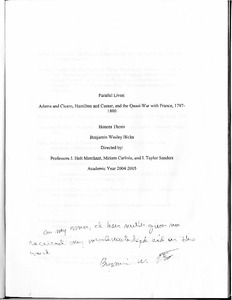| dc.rights.license | In Copyright | en_US |
| dc.creator | Hicks, Benjamin Wesley | |
| dc.date.accessioned | 2023-10-20T18:00:40Z | |
| dc.date.available | 2023-10-20T18:00:40Z | |
| dc.date.created | 2005 | |
| dc.identifier | WLURG038_Hicks_thesis_2005 | |
| dc.identifier.uri | https://dspace.wlu.edu/handle/11021/36429 | |
| dc.description | In the original, pages were assembled incorrectly for binding. The correct order has been restored in the digital version. | en_US |
| dc.description.abstract | The framers of the Constitution looked to the Roman and Greek states for guidance. To be educated was to know Latin and Greek, and to have read the ancient historians and philosophers. But among the many talented men who founded the new nation, to seize the Latin idiom, who condiderunt urbem ("founded the city"), the Classics played a central role to none more so than John Adams, excepting perhaps only Thomas J efferson. [2] Adams grew up learning Latin and Greek, and received an education at Harvard where his knowledge of antiquity only grew deeper. As an adult, Adams did not forget what he had learned from the pages of his favorite author, Cicero, and he took the lessons of the Roman Republic's collapse to heart. When he served as president, those lessons remained with him and prompted to him to see a new Caesar in Alexander Hamilton. During the United States's quasi-war with France from 1797 to 1800, Adams exerted every effort to keep Hamilton away from the high command of the Provisional Army (sometimes called the "New Army") that Congress had created. He feared that the pattern of an ambitious man at the head of an army destroying the republic -- which Julius Caesar exemplified -- would repeat itself in the United States, [2]
To understand this crisis through Adams's eyes as best one can, the modem reader must first examine the president's education and try to comprehend the collapse of the Roman Republic. Only then, can he or she understand Adams's reaction to Hamilton and his fears of the New Army in the light he would have viewed them. In so doing, the situation invites us to create the same sort of parallels with antiquity as the Founders. In effect, it invites us to do as Plutarch did, and to explore the lives of Adams and Cicero, Hamilton and Caesar -- in short, the effect that intertwining of the American experience and the Roman past had upon the presidency of John Adams. [From Introduction] | en_US |
| dc.format.extent | 50 pages | en_US |
| dc.language.iso | en_US | en_US |
| dc.rights | This material is made available for use in research, teaching, and private study, pursuant to U.S. Copyright law. The user assumes full responsibility for any use of the materials, including but not limited to, infringement of copyright and publication rights of reproduced materials. Any materials used should be fully credited with the source. | en_US |
| dc.rights.uri | http://rightsstatements.org/vocab/InC/1.0/ | en_US |
| dc.subject.other | Washington and Lee University -- Honors in Interdepartmental Work | en_US |
| dc.title | Parallel Lives: Adams and Cicero, Hamilton and Caesar, and the Quasi-War with France, 1797-1800 | en_US |
| dc.type | Text | en_US |
| dcterms.isPartOf | WLURG038 - Student Papers | en_US |
| dc.rights.holder | Hicks, Benjamin Wesley | en_US |
| dc.subject.fast | Adams, John,--1735-1826--Political and social views. | en_US |
| dc.subject.fast | United States--Civilization--Greek influences | en_US |
| dc.subject.fast | United States--Civilization--Roman influences and others | en_US |
| local.department | Interdepartmental Work | en_US |
